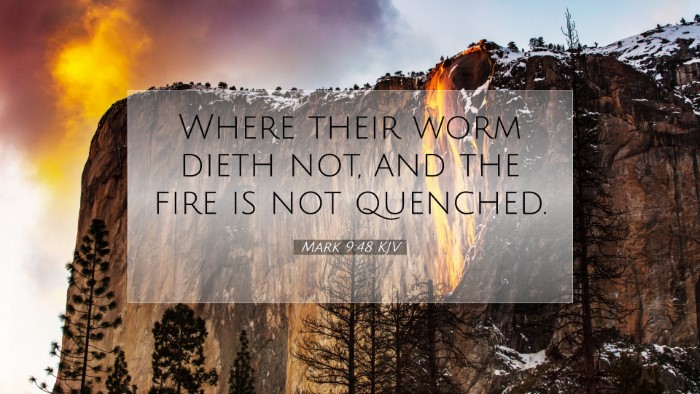Commentary on Mark 9:48
Verse Text: "Where their worm dieth not, and the fire is not quenched."
Introduction
Mark 9:48 presents a vivid image of hell’s torment, encapsulating the gravity of sin and the eternal consequences it incurs. This verse stands within the larger teaching of Jesus on the seriousness of sin, its repercussions, and the necessity of drastic measures in spiritual living. The commentaries of Matthew Henry, Albert Barnes, and Adam Clarke offer extensive insights into this profound declaration.
The Eternal Stakes
This verse is a part of Jesus' discourse on the reality of hell, highlighting the eternal nature of the punishment for unrepentant sinners. The imagery used—worms and unquenchable fire—serves to illustrate the ongoing and unending nature of this suffering.
1. Imagery of the Worm
Matthew Henry comments that the "worm" metaphor signifies a constant state of agony. It is not merely physical suffering, but a reflective emblem of the conscience that never rests. Just as worms consume decay, the anguish of regret and guilt consumes the soul in eternity.
Albert Barnes elaborates that the "worm" illustrates the internal torment of the soul. This presents a duality where, yes, there is external punishment represented by fire, but the internal harrowing of one's conscience—the unwavering reminder of choices made—poses the more profound tragedy.
2. The Unquenchable Fire
This fire, as noted by Adam Clarke, symbolizes not only suffering but also the purging of all evil. The fire's unquenchableness signifies that this judgment is not temporary; it stands as a stark contrast to God's mercy, highlighting the permanence of damnation.
3. Theological Implications
Collectively, these commentaries underline the theological implications of eternal hell. This reality challenges believers to confront the urgency of repentance and the seriousness of sin. In Henry's view, it is a call to vigilance, an admonition against taking lightly the path that leads to destruction.
The Context within Scripture
The context of Mark 9:48 is crucial for understanding its application. Jesus speaks to His disciples about the need to 'cut off' the sources of sin (Mark 9:43-47). The stark warnings serve as a call to action; the seriousness of the matter cannot be overstated.
4. The Holiness of God
The response of God to sin is rooted in His holiness. Barnes notes that the eternal nature of punishment acts as a testament to God's justice. Sin cannot be ignored or diminished; it must be dealt with, emphasizing the completeness of Christ’s sacrifice as the only remedy.
5. A Call for Reflection
Henry stresses that this passage ought to provoke deep introspection among believers. The imagery found in Mark 9:48 not only incites fear but encourages believers to affirm their faith and ensure they walk in righteousness, considering the eternal weight of their choices.
Application for Today
The application of Mark 9:48 is multifaceted. Pastors, students, and scholars should take heed of its urgent message and incorporate it in their exhortation toward holiness and repentance.
6. Preaching on Hell
Preachers should not shy away from discussing the realities of hell. Adam Clarke warns that neglecting to teach about such matters can lead congregations astray, emboldening sin instead of shortening the distance toward salvation. The starkness of this verse serves as a needed reminder of what is at stake.
7. Evangelism and Repentance
In the realm of evangelism, this verse highlights the urgency with which Christians ought to share the gospel, not merely as a call to heaven but also as a warning of the consequences of sin. Matthew Henry suggests that recognizing the horrors of hell can invigorate our witness.
Conclusion
Mark 9:48 serves as a solemn reminder of the eternal consequences of sin, encapsulating the heart of Jesus' message to avoid the pitfalls that lead to destruction. The collective insights from Henry, Barnes, and Clarke spark a profound reflection on holiness, justice, and our ultimate accountability before a holy God.
Such teachings equip the church to embrace the fullness of the gospel—celebrating grace while not dismissing the gravity of sin. In the pursuit of discipleship, the understanding of hell adds depth to our appreciation of God’s mercy and the urgency of our mission.


